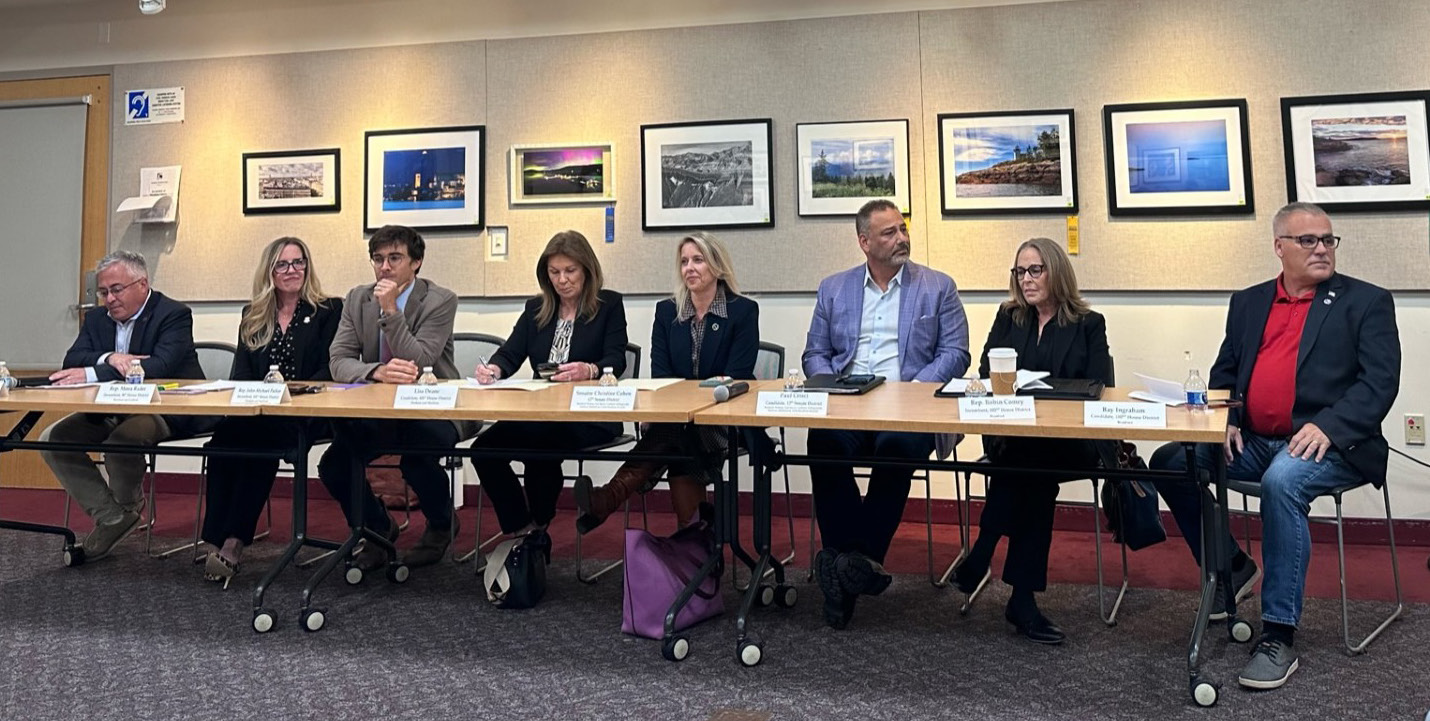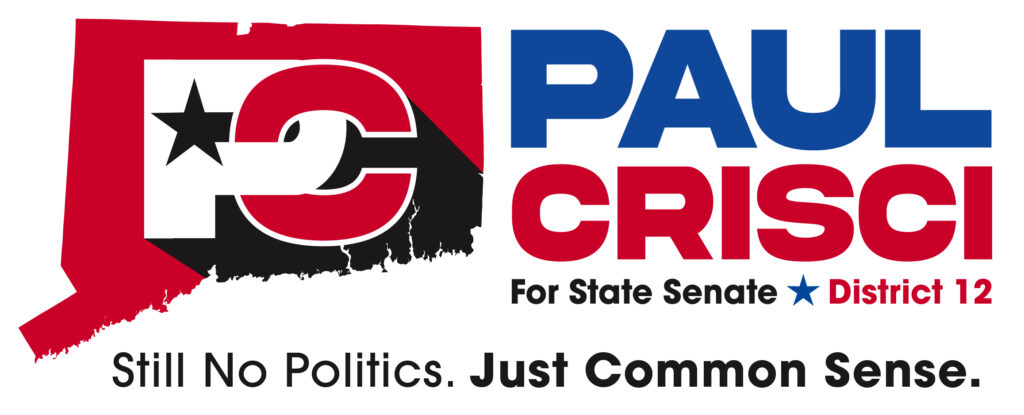NEWS
DATE: 10/24/24
Shoreline Chamber Candidate Forum Offers Some Debate Moments
While residents of District 12 familiarize themselves with early voting for the first time, and with less than two weeks until Election Day (November 5th), candidates are making their final rounds to ensure no stone is left unturned while courting voters. One organization that attracts a great deal of attention is the New Haven Shoreline Chamber, which organizes candidates in the district each year to address selected concerns and issues surrounding the business community. This election season features some familiar faces, including elected officials and second-time candidates from 2022.

Some may remember that in 2022, the Shoreline was not to be denied as they took their forum to a Zoom conference meeting in the name of social distancing. During that time, incumbents such as State Minority Leader and State Representative Vincent Candelora, State Senator Christine Cohen (challenged by Rep. Paul Crisci), State Representative John Michael Parker of the 101st District (challenged by John Rasimas), and State Representative Robin Comey of the 102nd District (challenged by Rep. Ray Ingraham) were all present. During the forum, candidates had 90 seconds to answer questions and comment on issues ranging from Connecticut’s financial health to small business regulations.
A major issue during the 2022 forum was the recovery of small Connecticut businesses after the pandemic. Each candidate responded similarly, acknowledging the need for collaboration to help small businesses return to where they were. Another question that provided an interesting twist was when each candidate was asked for their thoughts on the future of the Greater New Haven area. While each candidate provided a positive outlook, emphasizing the opportunities presented by the shoreline and cityscape, one candidate had a different perspective. “I want everyone to close their eyes for a minute and imagine if Yale New Haven Medical Facility and Yale University no longer existed. What would the Greater New Haven area have to offer, let alone the state of Connecticut?” This statement came from Paul Crisci, who was, at the time, a first-time challenger for the District 12 State Senate seat. Crisci continued his thoughts to the somewhat solemn group of candidates by explaining, “I am not being negative. I am being a realist. The state of Connecticut has lost an enormous number of big businesses, and the list keeps growing,” referring to notable companies such as Aetna Insurance and General Electric. Crisci warned that if we don’t pay attention to these losses—not only in corporate tax revenue but also in terms of the impact on employed taxpayers—we could find ourselves in a deficit while overburdening our residents. At the time, Crisci was criticized for his concerns and ultimately lost a respectable race to incumbent Christine Cohen.
Now, in 2024, the environment has noticeably changed from two years prior, with a live forum hosting eight candidates and approximately one hundred spectators preparing for the 2024 forum. Unlike in most years, this election is offering many of the same challengers to the incumbents, most notably Ingraham and Crisci in their same races. Newcomer Lisa Deane (R), best known for her efforts with the nonprofit Demand Zero, is replacing John Rasimas. Each candidate was given the opportunity a week prior to review the questions and prepare their thoughts and ideas. As in the past, each candidate was allotted sixty seconds for an introduction and then ninety seconds for every question thereafter.
As the candidates offered their thanks to the committee for their efforts, each had a moment to propose what legislation they would advocate if (re)elected. Many expressed their concerns about affordability and stated they would look to improve measures. Paul Crisci presented an interesting twist by detailing his vision for “Project 18-29 and Beyond,” a measure that, if passed, would offer business incentives to hire Connecticut-based individuals between the ages of 18 and 29, with provisions extending up to 34 years of age. Young adults in this age range would also benefit from “no tax” on home improvements during their first year of homeownership and interest write-offs for first-time car buyers. Crisci’s initiative also includes enhancing education from fourth grade and up to teach not only business concepts but also expose students to trades and municipal careers.
Following the opening remarks, each candidate had separate opportunities to answer questions regarding the unfriendliness toward Connecticut businesses, the struggles of Main Street, workforce housing, and, most notably, the rising cost of electricity. While incumbents (D) Christine Cohen, (D) Moira Rader, and John Michael Parker focused heavily on education, schools, and the environment, House Representative Candelora’s commentary delved deeper into the economic concerns of small businesses and majority leadership decisions while defending the Republican stance on these subjects. District 12 State Senate candidate Paul Crisci found himself, once again, two years later, in a position to challenge the status quo by asking about the root of the problem: “$2.8 billion in Covid relief funding to Connecticut. With that in mind, I have one question: how is it that we needed to burden the taxpayers with a moratorium fee on their electric bill for those who were unable to pay during the pandemic, yet we are spending money across the state on projects that have nothing to do with Covid relief?”
Unlike many of the other candidates, Crisci described himself as being redundant by replying to each question with, “As a state, Connecticut has generated tax revenue through the legalization of gambling and cannabis while collecting some of the highest property tax rates in the nation, including the significant tax burden on automotive vehicles.” Crisci asked, “Again, I ask: with all this new revenue, coupled with the collection of unfairly high property taxes, how did we not pass a budget this year? Why are we seeing our young adults unable to make ends meet in Connecticut?”
It wasn’t until Senator Cohen offered what she believed to be a message of hope, telling the audience that Connecticut’s future is one of opportunity due to the availability of over ninety thousand jobs in the state.
When given the opportunity to speak, Crisci acknowledged Senator Cohen’s comments by asking, “If Connecticut is doing so well and unemployment is at an all-time low, then I will ask one question: why is no one taking the opportunity to apply for these jobs?” Crisci, answering his own question, stated, “Because Connecticut is not affordable.” He then presented data from his binder: “Daniel College of Business ranks Connecticut 50th out of 50 states for financial tax burden on residents, surpassing New Jersey with an average burden of $44,300, almost $2,000 higher. CNBC reports for 2024 that Connecticut ranks 32nd out of 50 states for business rankings. U.S. News ranks Connecticut 49th for fiscal stability and 47th for business opportunity. Please, someone tell me where we are doing well. We have an issue with spending, taxing, and wasting resources in the state of Connecticut, and if we don’t fix this, we are going to see more businesses leave our state, as well as young people planting their roots somewhere else and unfortunately never coming back. This is not an easy fix, but if we don’t acknowledge that every project, including those related to the environment and affordable housing, stems from fiscal responsibility in Connecticut, we will never accomplish the goals that everyone at this table wants to achieve.” Crisci punctuated his statement by reiterating his solution: “This is why I believe my initiative, Project 18-29 and Beyond, can be the beginning of building a foundation in Connecticut and creating opportunities for young families to continue their lives and even possibly open their own small businesses.”
As the night drew to a close, each candidate was asked one more time what they would like voters to know about them. Each candidate took a moment to offer their vision and ideas one last time, with notable mentions including Lisa Dean, who promised to eradicate the illegal distribution of fentanyl in our state, and John Michael Parker, who reiterated his vision for education and affordability. One lighthearted moment came during candidate Crisci’s statement when he answered the final question, stating, “What I would like voters to know is that I have a wish: a wish that the tribalism between parties ends in our local elections. Each person up here is working hard to serve the public, and we should all be judged on our ability to get the job done on residents’ behalf.” Crisci continued, “Senator Cohen is not my adversary; she is my opponent. I do not hate her, and I would never condone anyone, including myself, attacking her business or her family. That is not okay.” Crisci’s closing sentence drew laughter, even from his opponent, when he stated, “For God’s sakes, my neighbors all have Cohen signs, as if I don’t know who they’re voting for.”
As a reminder, early voting begins October 21st and continues through November 5th. Please check your local voting district for exact times and locations.
